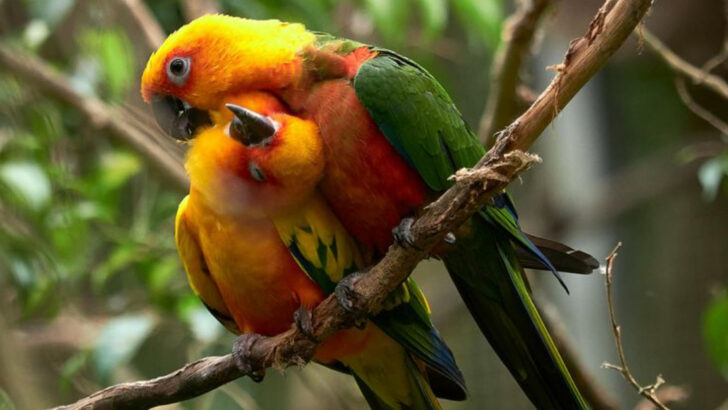Some birds can’t stand to be alone. They don’t just enjoy company—they need it to stay happy and healthy. Leave certain parrots or finches solo too long, and they can spiral into stress, self-plucking, or nonstop screaming. But pair them with a buddy? Total transformation. From the super-social to the surprisingly needy, some pet birds absolutely thrive with a feathered friend by their side. Others simply can’t function without one. If you’re thinking of getting a bird—or already have one—this list might change everything. Because for some species, friendship isn’t optional. It’s survival.
Budgerigar
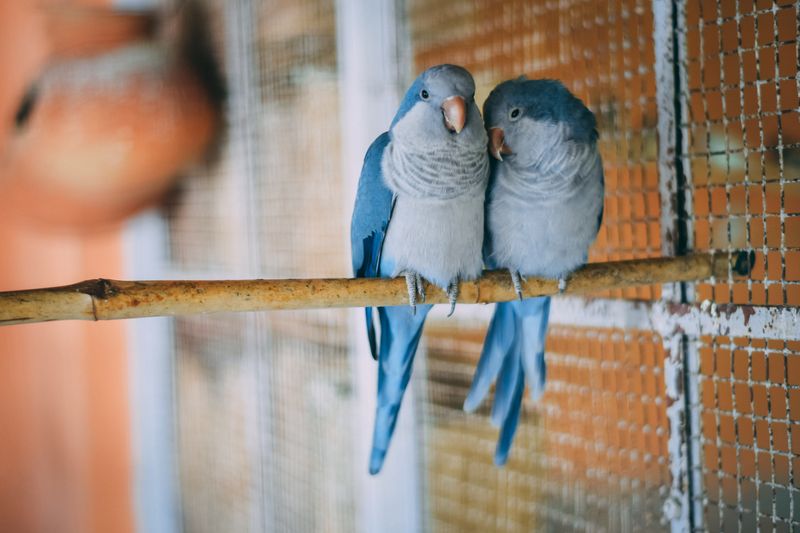
Budgerigars, often known for their vibrant hues and playful antics, flourish when they have a buddy to share the fun. Imagine them chattering away, mimicking sounds, and sharing meals. These sociable birds enjoy the camaraderie, which helps them stay mentally stimulated.
However, their bond is not just about play. They groom each other, reinforcing their connection. This companionship prevents feelings of loneliness and stress.
Did you know? Budgerigars are native to Australia, where they live in large flocks. Their social nature is deeply rooted in their instincts, making them thrive with a friend.
Cockatiel
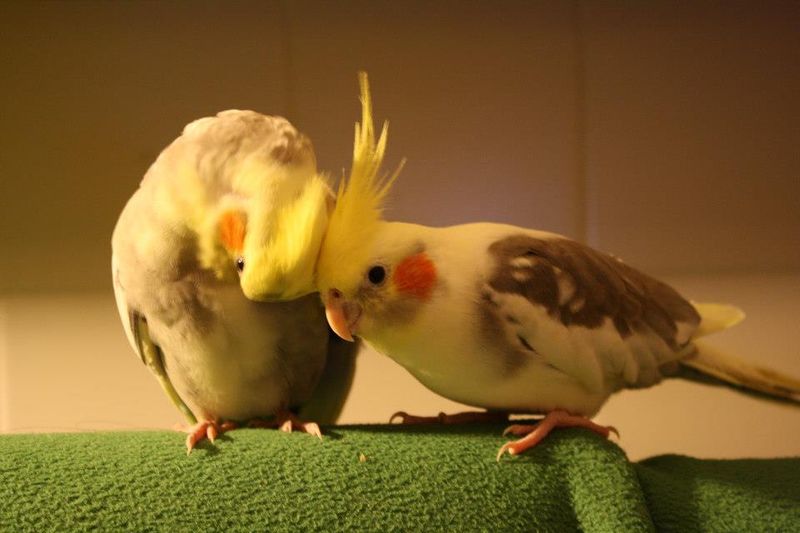
Cockatiels, known for their charming crests and affectionate whistles, feel at ease with a companion. A pair shares delightful serenades, creating a harmonious duet that fills the air with melodies.
This bond is strengthened by their practice of mutual grooming, where they preen each other’s feathers with care. Such interactions keep their spirits high and stress levels low.
Interestingly, Cockatiels are native to the open scrublands of Australia, where they live in flocks. A partner helps them emulate the social settings they grew up in, providing comfort and joy.
Lovebird
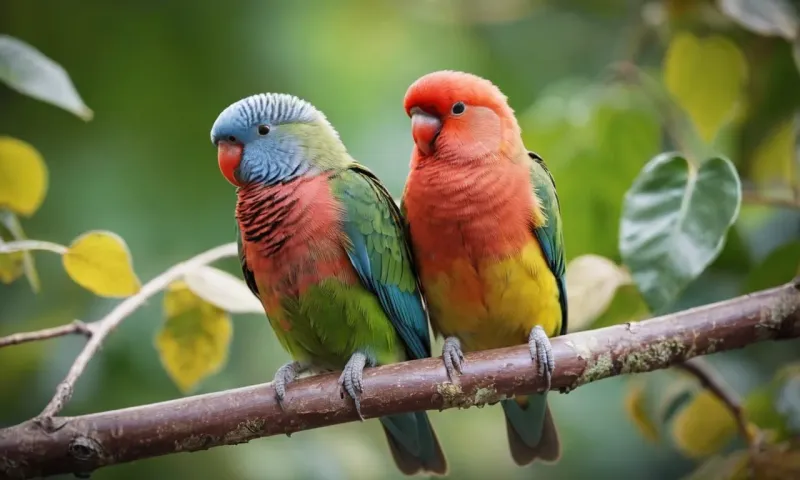
Named for their affectionate nature, Lovebirds truly live up to their moniker. These birds are happiest in pairs, often seen snuggling up close and sharing gentle nibbles.
Their companionship is vital as they express emotions through touch and closeness. A solo Lovebird may become withdrawn or stressed without its partner.
Lovebirds originate from Africa, where they form strong monogamous bonds. In captivity, these traits persist, making it essential to have a buddy. The presence of another bird ensures they stay content and lively.
Parakeet
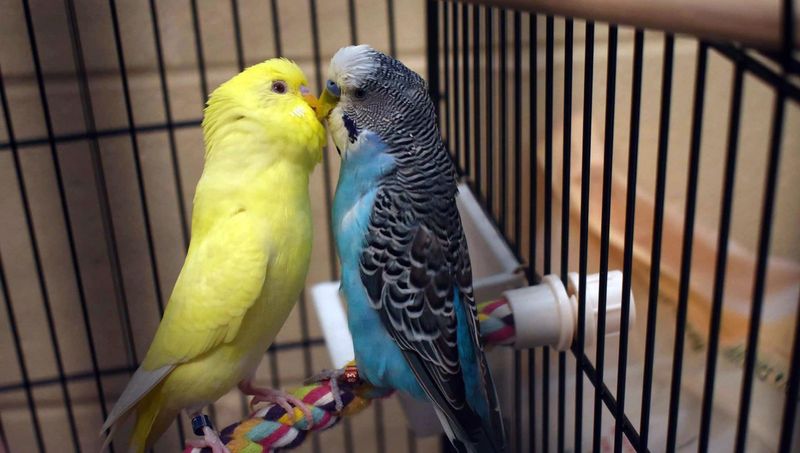
Parakeets are delightful, spirited creatures that thrive in pairs. Their bubbly personalities shine through as they chatter, swing, and explore together.
Sharing their space with another bird means they have a companion to mimic and learn from, which keeps them engaged and content. The absence of a partner can lead to boredom and loneliness.
Did you know? Parakeets are among the most popular pet birds in the world. Their friendly and social nature demands companionship, often leading them to form strong bonds with both their bird and human companions.
Conure
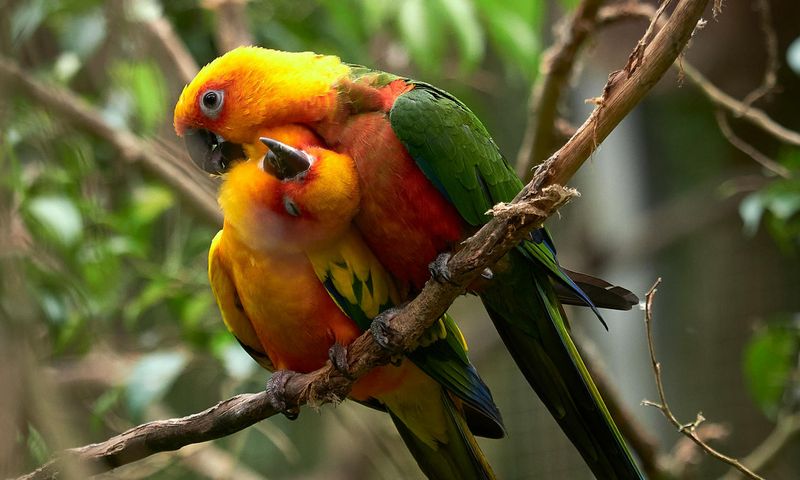
Conures, with their lively personalities and vibrant plumage, are social butterflies of the avian world. They thrive with a companion, sharing an endless zest for life.
Engaging in playful antics, Conures communicate through a variety of vocalizations, creating a lively environment. A companion ensures they remain entertained and fulfilled.
Originating from Central and South America, they are used to flock life, thriving in social groups. A partner replicates this dynamic, keeping them happy and stress-free. Alone, they might become frustrated, so keeping them in pairs is ideal.
African Grey Parrot
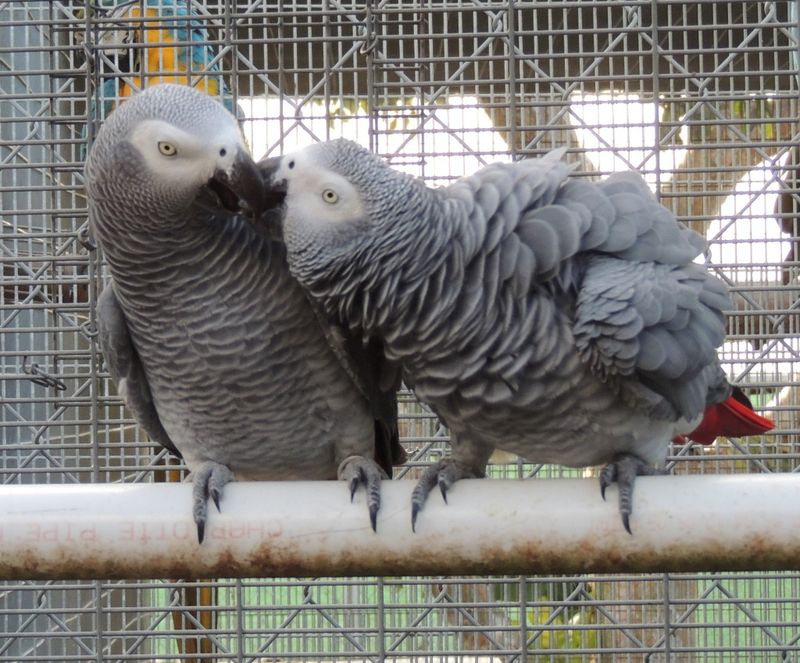
African Grey Parrots are renowned for their intelligence and emotional depth. A companion helps them express and share their cognitive skills.
In pairs, they engage in problem-solving activities together, keeping each other mentally sharp. This partnership prevents boredom, which can lead to stress and behavioral issues.
These parrots hail from the rainforests of West and Central Africa, where they thrive in social groups. A companion replicates their natural environment, allowing them to express their innate behaviors and remain content.
Macaw
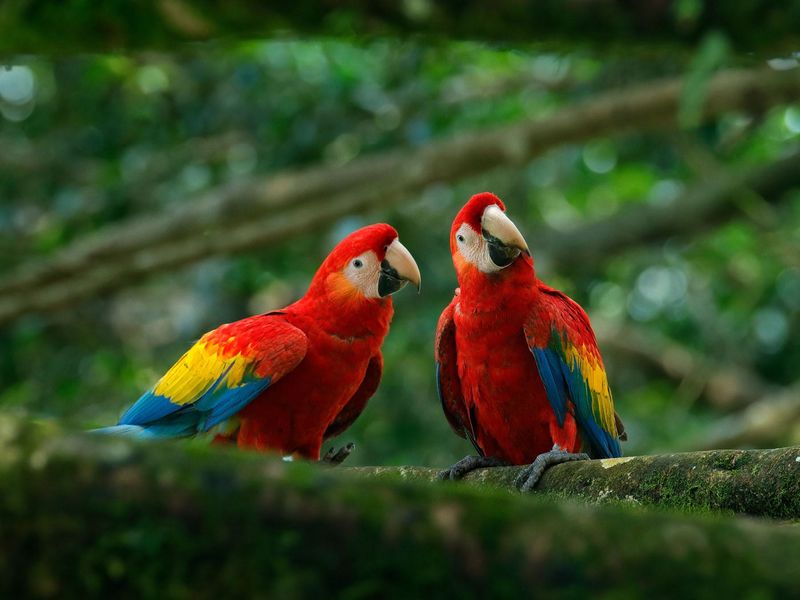
Macaws, with their striking colors and charismatic personalities, are social creatures that blossom with a partner. Together, they indulge in playful interactions and mutual grooming.
Their strong bond is evident in their synchronized movements and shared vocalizations. This companionship is crucial, as solitude can lead to stress and unwanted behaviors.
Originating from the rainforests of Central and South America, Macaws are accustomed to living in flocks. A companion mimics this setting, providing the social structure they need to thrive.
Canary
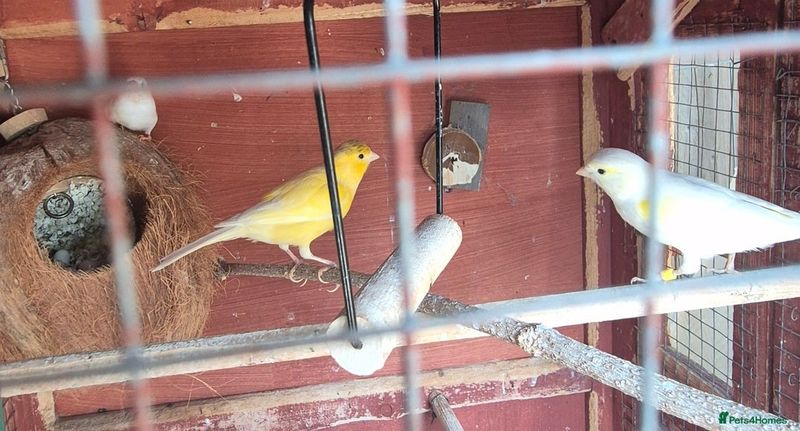
Canaries are famous for their sweet melodies and cheerful disposition. Having a companion can amplify their joyful nature, as they often engage in spontaneous duets.
A partner provides emotional support, allowing them to express their vocal talents freely. This bond helps reduce stress and encourages their natural behaviors.
Native to the Canary Islands, these birds are used to social settings. While they can live alone, having another bird ensures they remain lively and content, bringing music and joy to their environment.
Zebra Finch
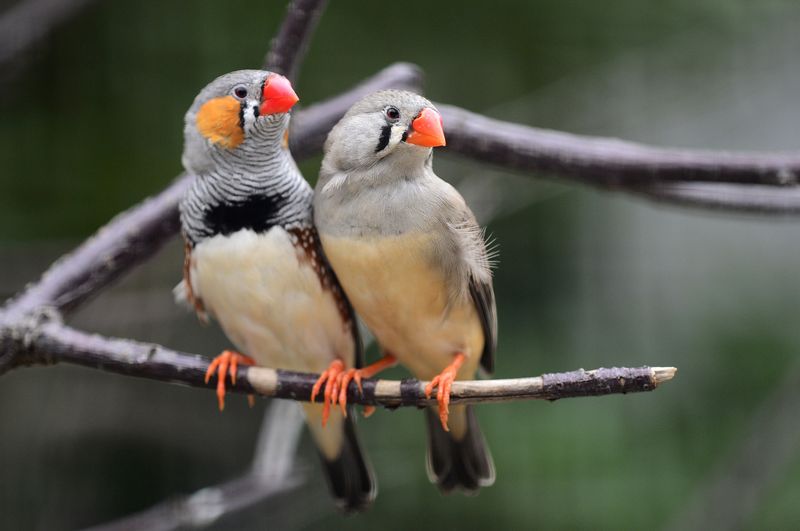
Zebra Finches, with their lively chirps and energetic demeanor, shine in pairs. They engage in constant communication, sharing melodious conversations throughout the day.
A partner helps keep their spirits high, providing companionship and mutual preening, essential for their well-being. Alone, they might struggle with loneliness.
These birds hail from the grasslands of Australia, where they live in flocks. Their social instincts make them thrive with a buddy, ensuring they remain active and healthy, both physically and mentally.
Amazon Parrot
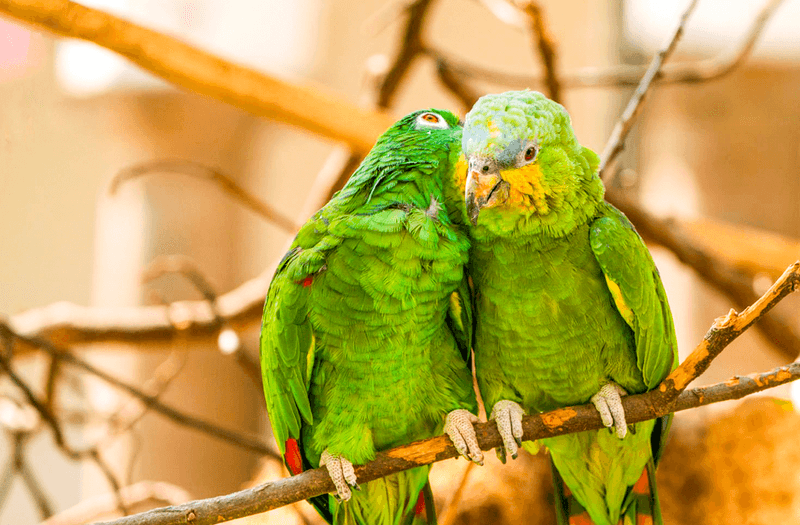
Amazon Parrots, known for their vibrant personalities and vocal talents, thrive with a partner. Their bond is strengthened through shared vocal exercises and playful interactions.
A companion ensures they remain mentally stimulated, preventing boredom and stress. This partnership mirrors their natural flock dynamics, essential for their happiness.
Originating from the rainforests of the Americas, these parrots are accustomed to social living. A buddy helps replicate this environment, providing them with the necessary social structure to maintain their lively and engaging nature.
Indian Ringneck Parakeet
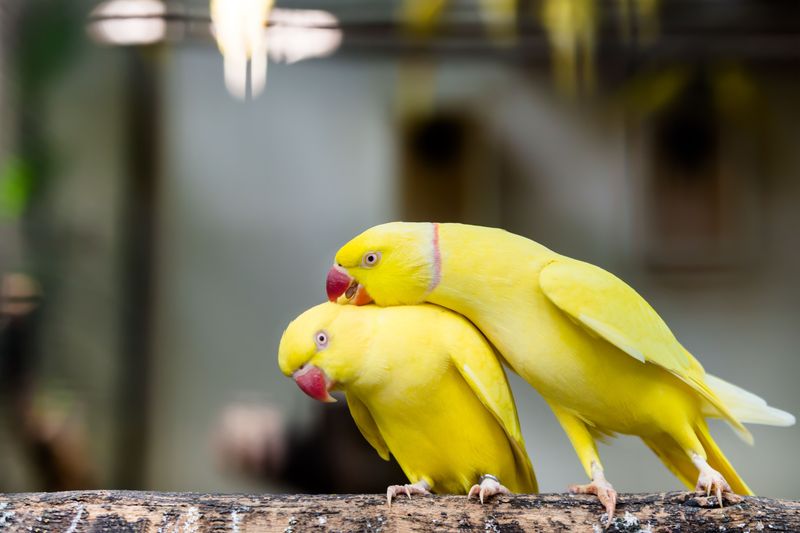
Indian Ringneck Parakeets, with their striking appearance and playful nature, flourish when kept with a partner. They engage in vocal duets and interactive play, fostering a strong bond.
A companion provides the mental stimulation they crave, reducing the risk of behavioral issues and stress. This connection mirrors the social settings they’re accustomed to in the wild.
These parakeets originate from the forests of India and Africa, where they live in flocks. A partner helps them emulate this natural environment, ensuring they remain content and lively.
Quaker Parrot
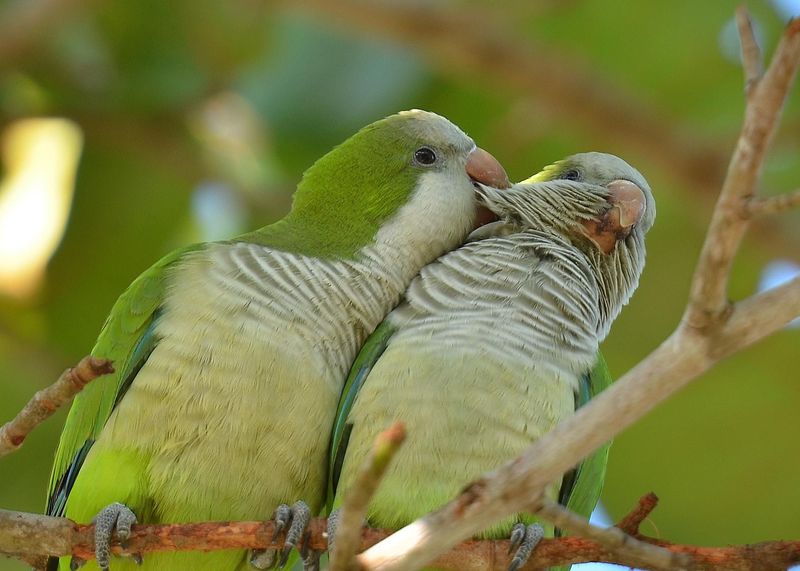
Quaker Parrots, also known as Monk Parakeets, are social and intelligent birds that flourish in pairs. Their playful nature is magnified when they have a buddy to share it with.
With a companion, they engage in interactive play and mimicry, enhancing their cognitive abilities. This social bond is crucial for their emotional well-being, preventing stress.
Native to South America, Quaker Parrots are used to colony life. Keeping them with a partner replicates their natural setting, ensuring they remain happy and entertained.
Bourke’s Parrot
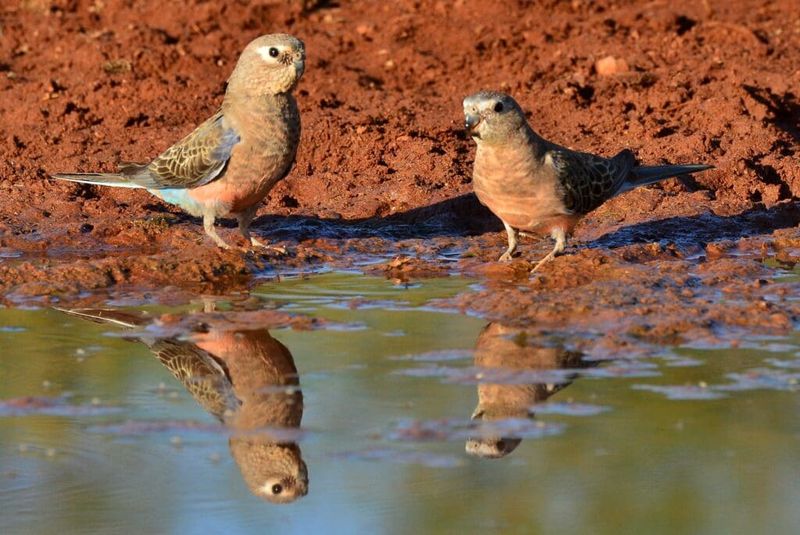
Bourke’s Parrots, with their gentle personalities and soft vocalizations, are most content when with a companion. Together, they share peaceful moments and quiet conversations.
A partner helps keep them engaged and emotionally balanced, reducing the risk of loneliness and stress. This companionship mirrors their natural social structures.
Originating from the arid regions of Australia, they are accustomed to living in small flocks. Having a buddy ensures they feel safe and secure, replicating the social interactions they need to thrive.
Senegal Parrot
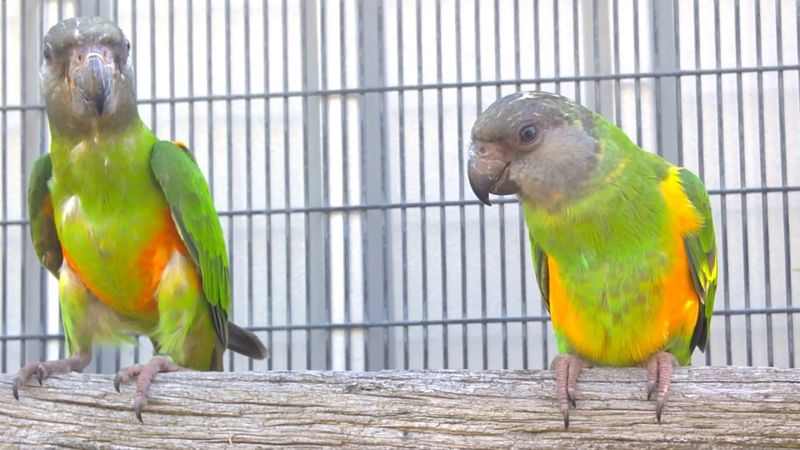
Senegal Parrots are known for their calm demeanor and ability to form strong bonds. A partner enhances their well-being, providing emotional support and companionship.
Together, they engage in playful activities and share affectionate moments, which helps reduce stress and promotes happiness. This bond is vital for their mental health.
These parrots originate from the woodlands of West Africa, where they thrive in social settings. A companion replicates the dynamics of their native environment, ensuring they remain content and balanced.
Eclectus Parrot
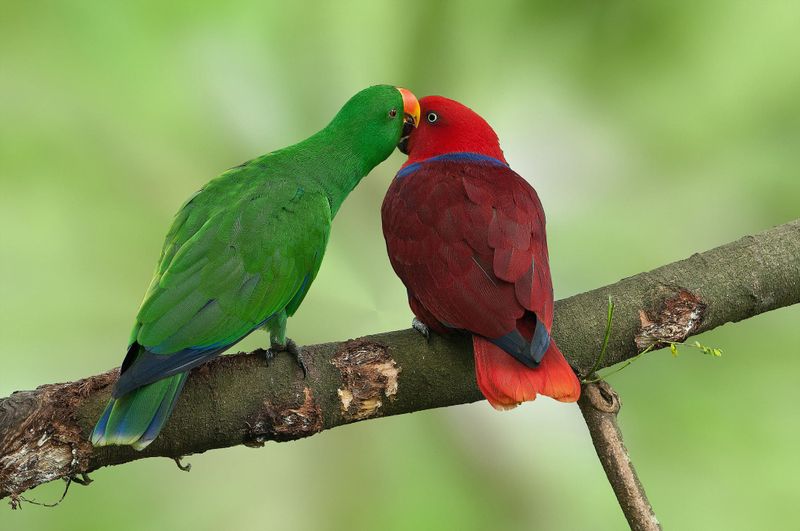
Eclectus Parrots are known for their unique sexual dimorphism, with males and females displaying different vibrant colors. In pairs, they engage in mutual grooming and social interaction.
A companion helps them maintain their mental and emotional health, reducing the risk of stress and boredom. Their bond is essential for their overall well-being.
These parrots originate from the Solomon Islands and New Guinea, where they live in flocks. Having a partner replicates their natural social structures, ensuring they thrive in captivity.
Rosella
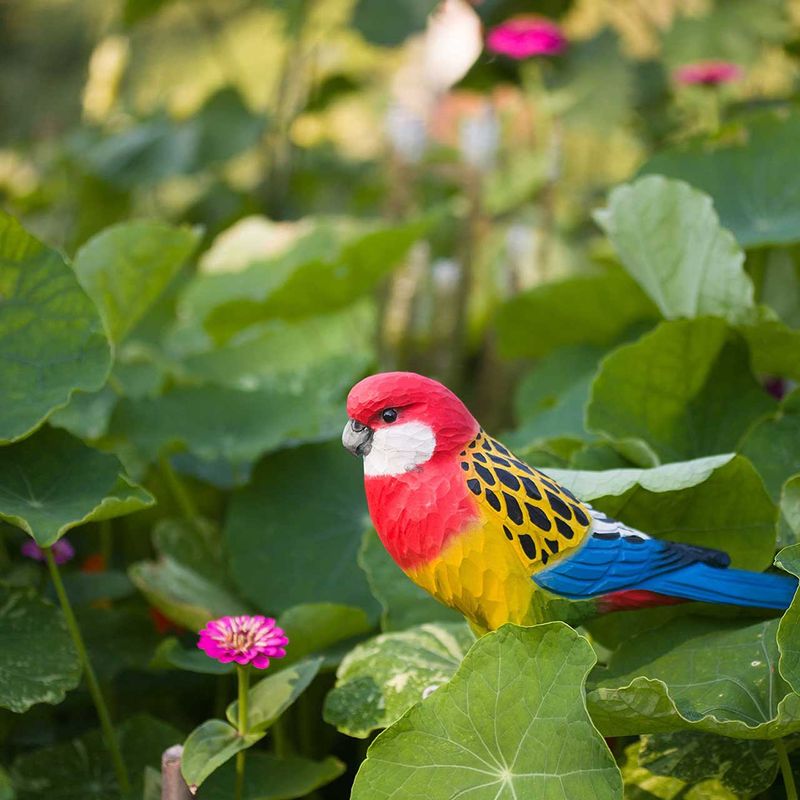
Rosellas, with their vibrant colors and sprightly nature, thrive with a companion. Together, they engage in playful antics, exploring their environment with curiosity.
A partner ensures they remain entertained and mentally stimulated, reducing the risk of loneliness and stress. This bond is crucial for their overall well-being.
Originating from Australia, Rosellas are accustomed to social settings. A companion helps them replicate the flock dynamics they’re used to, ensuring they remain content and lively.
Cockatoo
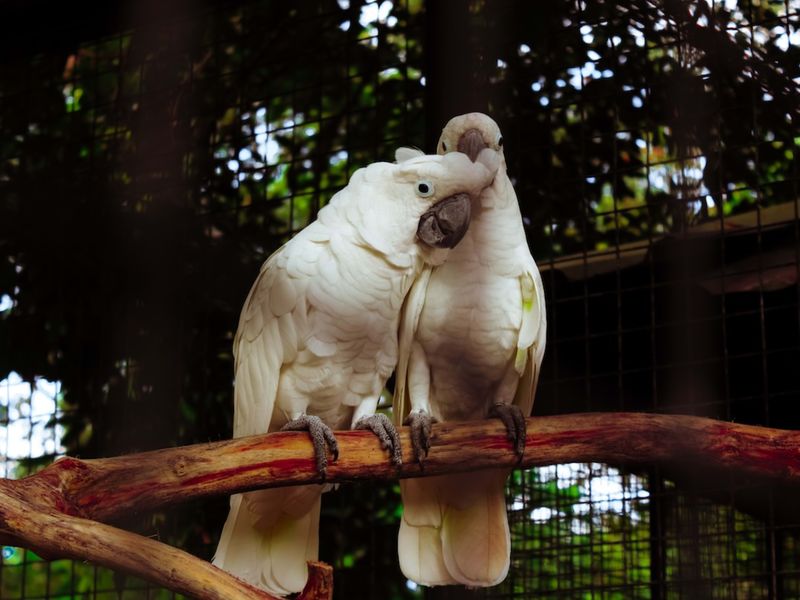
Cockatoos, known for their expressive crests and playful behaviors, thrive with a partner. Together, they share exuberant interactions, engaging in synchronized dances and vocalizations.
Their bond is essential for emotional stability, as Cockatoos can become stressed when left alone. A companion helps maintain their mental health.
These birds are native to Australia and nearby islands, where they live in large flocks. A partner replicates their natural social structure, ensuring they remain happy and well-adjusted in captivity.
Pionus Parrot
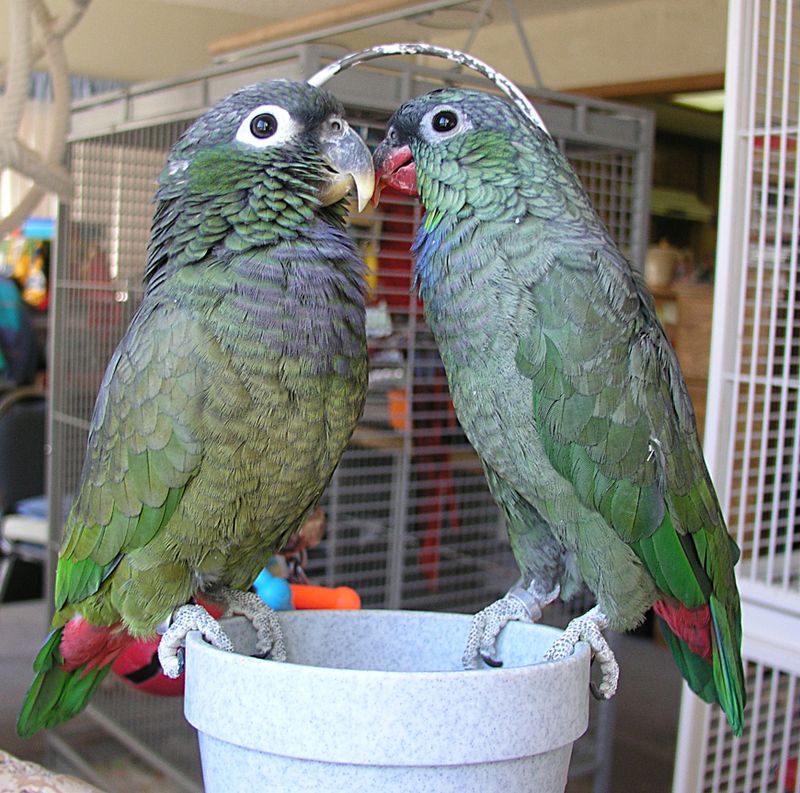
Pionus Parrots, with their gentle temperaments and subtle beauty, flourish with a companion. Together, they share quiet moments and engage in mutual preening.
A partner helps keep them emotionally balanced, reducing the risk of loneliness and stress. This bond is crucial for their well-being.
These parrots originate from Central and South America, where they thrive in social groups. Having a companion replicates their natural environment, ensuring they remain content and well-adjusted.
Red-crowned Crane
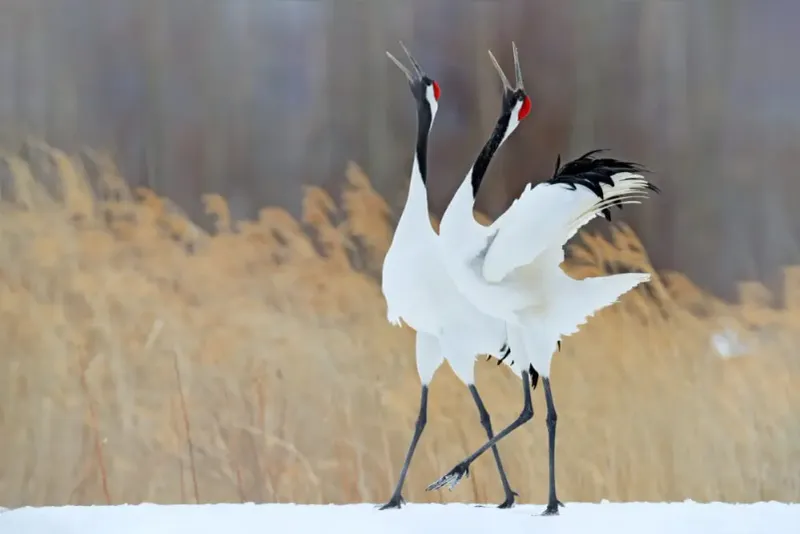
The Red-crowned Crane, symbolizing longevity and fidelity, thrives in companionship. It displays a captivating dance, especially when paired, making it a visual delight. These cranes cherish their close-knit bonds, often seen preening one another.
Their majestic presence is complemented by a gentle call that resonates in harmony when in pairs. It’s this companionship that boosts their spirits and well-being.
Interestingly, the species has inspired countless cultural tales across Asia, depicting them as messengers of happiness. In captivity, a pair ensures a life filled with joy and picturesque elegance.

